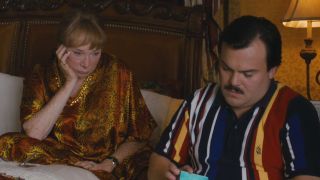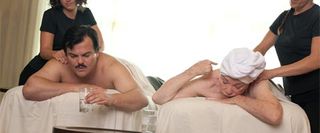Bernie Director Richard Linklater Talks Finally Making His East Texas Movie

As explained in director Richard Linklater’s new movie Bernie, the state of Texas is actually made up of multiple cultural regions. But while movies have done a great job putting areas like Austin and West Texas on the big screen, the Dazed and Confused filmmaker has always wanted to make a movie about where he grew up in East Texas. The story of Bernie Tiede and the murder of Marjorie Nugent has allowed him to do just that.
With Bernie in theaters this weekend, I recently had the chance to sit down with Linklater one-on-one to discuss not only his desire to make an East Texas film, but working with Jack Black and Matthew McConaughey again, how he discovered the story of the famed killing, and the choice to use the documentary format to tell the story. Check it out!
Where did you actually discover the story of Bernie Tiede?
It was an article in Texas Monthly that I happened to read and went, “Wow, that’s kind of a great group of characters, a great story! Is there a movie there?” I guess I must have wanted to make a movie from East Texas, my home. It’s like when Scorsese read “Wiseguy, ” he called up [Nicholas] Pileggi and said, “I’m doing this other thing, but there’s this other thing that I’ve been wanting to do for years, so two movies from now…” You just know it. This is a movie that’s in me. So that’s my version of, “East Texas, no one gets it. This is my chance to show them.”
And when did you actually start working on the script?
Around that time – late ‘90s. I had a first draft back then and then it just took a while. Since the time I read the other story I had about 10 other movies. It was on the backburner for years. I think it was having worked with Jack, and once he was getting older thinking, “Hey, he might be good for Bernie! I know he can sing.” There were certain pre-requisites for Bernie and he was just perfect. You know how when you see a performance you go, “No one else could do that.” No one else could sing and perform and look like him; it’s just a one-off performance that you won’t get from anyone else.
On that note, in addition to Jack Black you also had Matthew McConaughey, with whom you’ve also worked before. Given that you were so passionate about this project, was that an element you wanted to include, people with whom you’ve worked with previously?
CINEMABLEND NEWSLETTER
Your Daily Blend of Entertainment News
Yeah! I called up Matthew and I was like, “This is the East Texas movie! We’re the East Texas boys!” When I first met Matthew, there he was, a UT film student, he came in for an audition and I he told me he was from Longview, Texas, I just went, “Oh, well you know…” There’s an immediate little bond there. We found out later that our dads played together on the same college football team, we have some lengthy, long-term bond. But I called him sort of begging. “Matthew, come on! I’m going to do this East Texas movie, you have to gotta be in it! You have to! I think you could have fun with it.” Because Matthew is a character actor, he really is.
We also get to see him in the courtroom again, which is always a bonus.
Yeah, he said it was his first time to be on the other side. He’s always been a defender, know he gets to be a prosecutor. So it was fun to be that guy for once.

To talk more about the script, did you always know it was going to be in the documentary format?
Those interview gossips, yeah. That was first draft. I was thinking that was the right way to tell the story, through all these townspeople. Because you think about it: she’s dead, he’s in prison, they’re not talking, what’s left? In a small town there’s just this huge reverberation of gossip that really defines you in a small town environment, for better or worse. Gossip is kind of a social control mechanism for behaviors and accepted behaviors and social control, really. It functions that way. I remember just being a kid in a town, everybody knew my business. Everybody. And there’s a sweet side to that, you know, I’m sick for a few weeks and you hear that the First Baptist Church said a prayer for you today at the service. You’re like, “That’s so sweet, we don’t even go to that church!” You really do. It’s heartfelt and they mean it. My mom still lives there. It’s a very…I don’t know how to put it…friendly, nice, supportive kind of environment. And there’s kind of darker side. Once you’re in, if you’re the other… In the south they’re friendly. You’re kind of good until proven…they’re open. You get your chance. And when you step outside that like Miss Nugent did…She wasn’t friendly. She didn’t do that other thing. She didn’t ask about the kids. She didn’t give a shit and she was upfront about that. And that just makes you say, “Okay, she’s not one of us. She’s a bitch. She’s not playing by the accepted rules here.”
Do you think she would have fit better somewhere like Los Angeles or New York?
Yeah, clearly that’s a big city she should have been living in, a bigger environment where they don’t care so much about that and her philanthropic givings. She probably would have been happy with the cultural things, that’s why you go to big cities. I don’t know what she was doing there. But it was just her culture – she was from not too far from there. I don’t know. I don’t know.
One of the things I really liked about this film is that the documentary-style filmmaking kind of allows you to be completely objective. We listen to all sides of the story. Was that part of your intention?
Clearly it’s up to you to process all of this information. Just the way you do, you have some facts, you think of all these opinions, and how do you reach your real opinion or conclusion? A journalist told me it’s like a journalist’s story: you have interviews, you have all these quotes, and then you write, here’s your part, and I never thought of it that way. But it all builds to some conclusion.
How did that affect the screenwriting process? Obviously you had a lot of improve in this movie.
Yeah, mainly in the rehearsal room. We had 22 days to shoot the whole movie. We couldn’t go, “Oh, let’s just see what happens.” It’s pretty tight, actually. In those gossip interviews I encouraged them to kind of throw in their own lines and put in their own words. Even all that stuff was scripted.

Eric Eisenberg is the Assistant Managing Editor at CinemaBlend. After graduating Boston University and earning a bachelor’s degree in journalism, he took a part-time job as a staff writer for CinemaBlend, and after six months was offered the opportunity to move to Los Angeles and take on a newly created West Coast Editor position. Over a decade later, he's continuing to advance his interests and expertise. In addition to conducting filmmaker interviews and contributing to the news and feature content of the site, Eric also oversees the Movie Reviews section, writes the the weekend box office report (published Sundays), and is the site's resident Stephen King expert. He has two King-related columns.
Most Popular







